Luzhniki Stadium: Russia
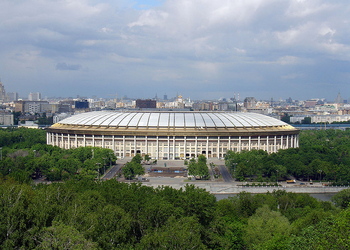
Dmitry Fedoseev / Flickr.com
The Luzhniki Stadium has an interesting history when you look at it. It was built between 1955 and 1956 and was the home of the USSR national side until the break-up of the Soviet Union at the start of the 1990s. After that it became the home of the Russian national side instead. The stadium was chosen to be the location for the most important matches of the 2018 World Cup once Russia had been awarded the right to host it in 2010, but it was clearly in no fit state to handle such prestigious games.
As such, a decision was undertaken to renovate the stadium ahead of the FIFA World Cup. Unlike other stadiums such as Wembley, however, the ground was not completely demolished before a new stadium was built in its place. Instead, it was completely and utterly gutted and the insides were replace with a much more modern and exciting alternative. Part of the Luzhniki Olympic Complex and located in the Khamovniki District of Moscow, the stadium was seen as the ‘heart of Russian sport’ when it first opened its doors.
Stats
| Luzhniki Stadium Stats | |
|---|---|
| Year Opened | 1956 |
| Capacity | 81000 |
| Average Attendance | 78011 |
| Record Attendance | 102538 (USSR v Italy (1963)) |
| Pitch Size | 108 x 68 (7344) |
| Former Name | Central Lenin Stadium |
| Owner | Government of Moscow |
| Clubs Hosted | PFC CSKA Moscow, Torpedo Moscow, Spartak Moscow, Russian National Team |
| Russia Stats | |
|---|---|
| Nickname | Медведи (Bears), Золотые орлы (Golden Eagles) |
| Rivals | Ukraine |
| Previous Stadiums | Russia also play at Petrovsky Stadium, Otkrytiye Arena & Arena Khimki |
| Kit | Maroon (Home) / White & Blue (Away) |
| Record Goalscorer | Aleksandr Kerzhakov (30) |
| Record Appearances | Sergei Ignashevich (120) |
Luzhniki Stadium Photos
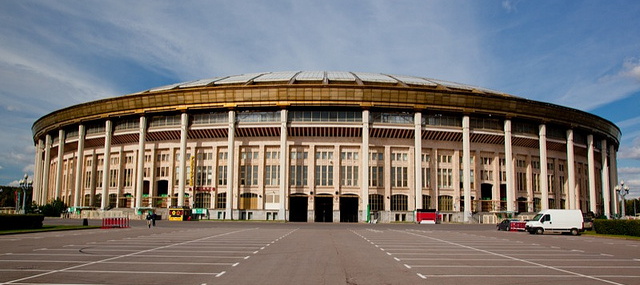
Peter Stanik / Flickr.com
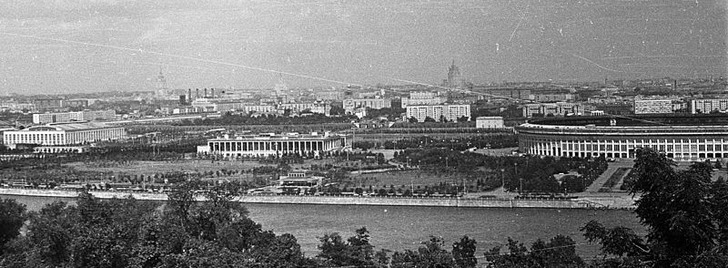
FOTO:FORTEPAN / Lencse Zoltán [CC BY-SA 3.0]
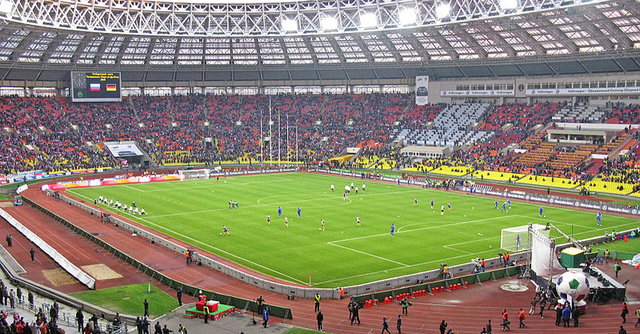
By own work (Own work) [Public domain]
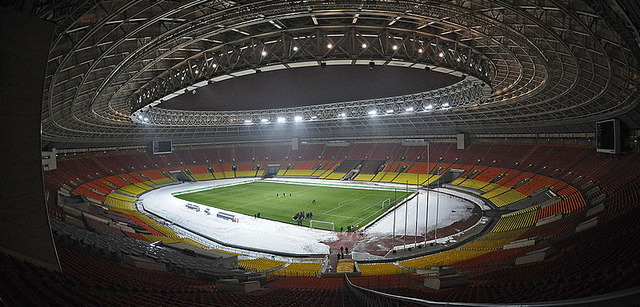
By V&A Dudush (Panoramio) [CC BY 3.0]
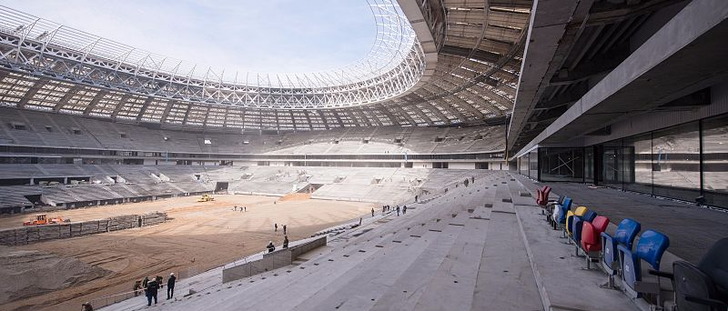
Mos.ru [CC BY 3.0]
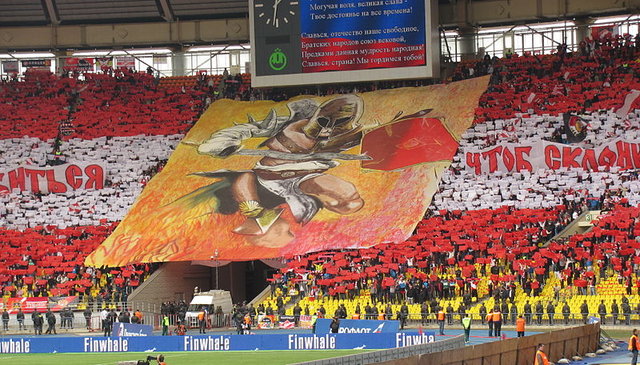
By Илья Яковлев (Own work) [CC BY-SA 3.0]
Luzhniki Stadium Seating Plan and Where to Sit
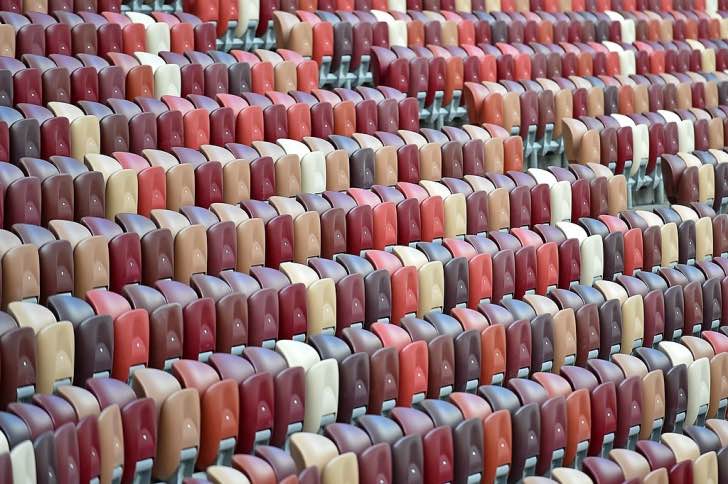
The Luzhniki Stadium has a bowl design of continuous seating, popular with both new builds and European grounds. The North and South Stands are behind each of the goals. The East and West Stands, meanwhile, run along the length of the pitch and the latter contains the players’ tunnel, the dugouts and the more expensive seats.
Russia Ticket Prices
Ticket costs for Russia games change from one match to the next. There is no real set fee and the amount you’ll pay will depend upon the prestigiousness of the opposition and where in the ground you would like to sit. For example, for the 2017 Confederations Cup Russian citizens pay from 960 rubles for a group match game through to a top-end price of about 15,825 rubles for the final of the competition.
How To Get Russia Tickets
Tickets for international matches are traditionally sold by either the national side’s FA, the controlling body of the competition such as FIFA or UEFA or from selected third parties.
Where to Buy
Getting To Luzhniki Stadium
Travelling to Russia is a long-winded affair if you’re heading there from the UK. Here are some of the more traditional journeys you might consider to Moscow, though:
Train – It will take you just under two days to get from London to Moscow by train. The quickest route will take you via Brussels, Köln and Warsaw. Once you’re in the city you’ll want to take the Metro to get to the ground. The closest stop is Sportivnaya (СПОРТИВНАЯ in Russian) and that’s on Line 1, the Red line. you can get there from Lubyanka Station in the centre of the city.
Bus – Buses T31, 255 and 05 all call near enough to the stadium.
Car – Driving in Russia is an…interesting experience. If you’re determined to do it, though, then it will take just over quarter of an hour if the traffic’s on your side. You’ll take the пр-д Театральный to пер. Малый Черкасский then get onto ул. Ильинка. And if you understand all of that then you’ll be able to keep your eye out for signs easily enough.
By Air – Moscow has four different international airports in its vicinity, so its reasonable to suggest that you’ll want to fly into one of them. Sheremetyevo handles about 60% of the city’s air traffic and so that’s the one to keep an eye out for.
Taxi – A taxi from a well-known city centre landmark such as the Kremlin to the Luzhniki Stadium will set you back in the region of 600 Russian rubles.
Parking Near Luzhniki Stadium
There is a large parking area at the stadium where you can leave your car for free for the day. It costs money to get into the grounds of the sports complex, but the parking itself doesn’t cost anything.
Useful Resources
Luzhniki Stadium Hotels
Moscow is Russia’s capital, so there are a huge number of hotels for your consideration. Here are some of the better ones:
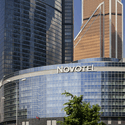
Novotel Moscow City - £60+
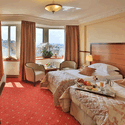
Golden Ring Hotel - £80+
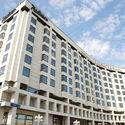
Radisson Slavyanskaya Hotel & Business Centre - £115+
Pubs and Bars Near Luzhniki Stadium
As you’d expect from a capital city, most of Moscow’s best watering holes are in the centre of town. Here are some ones to look out for:
Union Jack
Mollies Irish Pub
Bobby Dezzler Pub
Facilities
It’s fair to say that, as one of the newest grounds anywhere in the world, the facilities at the Luzhniki Stadium are as good as they get. You’ll be able to buy all of the usual overly expensive drinks and snacks on the large concourses and enjoy brilliant views from pretty much anywhere inside the ground.
Hospitality

One of FIFA’s major demands for its host stadiums is that the hospitality suites are up to scratch in a big way. The fat cats at the top of the world game don’t want to have to mix with the hoi polloi when they can be sipping champagne and eating canapés with other members of football’s top brass, after all. As such, there are a number of top-notch hospitality options available at the Luzhniki Stadium that you’ll be able to take advantage of should you wish to.
Private Hire
There is not a top-class stadium in the world that doesn’t do everything that it can to earn back some of the money spent on its construction if it’s given half a chance, with the Luzhniki Stadium being no exception. The same suites, boxes and lounges that welcome the most important members of FIFAs delegations will also be available for private hire once the entire stadium is up and running as a going concern.
Stadium Tours & Museum
There are no tours of the Luzhniki Stadium itself in progress at the time of writing, but in the build-up to the World Cup itself we expect that to change. Similarly, there was a museum at the ground but this was closed as it underwent renovations ahead of the Greatest Show On Earth. It may well re-open and if it does then we’ll be sure to let you know.
About Russia
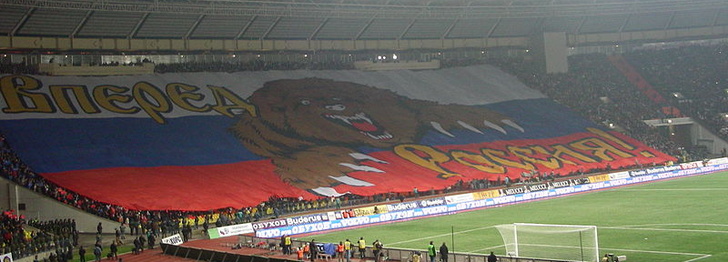
The Russian national side’s history can be split into two sections: Pre-breakup of the Soviet Union and post. In the days when it was better known as the USSR it enjoyed a reasonable amount of success. The USSR finished fourth in the 1966 World Cup, was the runner-up in the 1964, 1972 and 1988 European Championships and won the same competition in 1960. The USSR also warned two Olympic Gold medals in the football tournaments of 1956 and 19888.
The modern day Russia team played its first game in 1992 after the breakup of the Soviet Union and has struggled to enjoy the same success as it did when it was a united nation. They have yet to make it out of the group stage of any FIFA World Cup tournament and failed to qualify for it in 1998, 2006 and 2010. In the Euros they also failed to get out of the group at each time of asking with the exception of 2008 when they made the semi-finals.
Luzhniki Stadium History
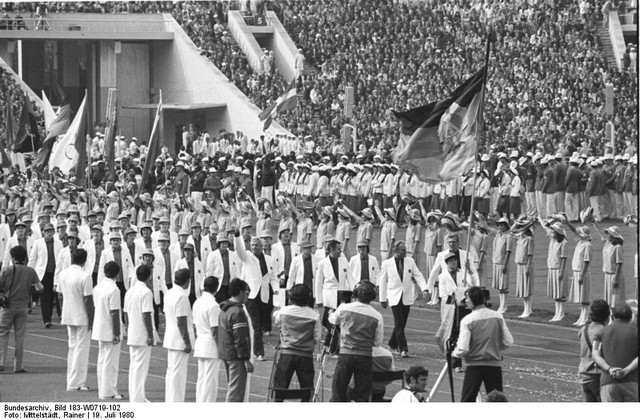
The word ‘Luzhniki’ translates roughly as ‘The Meadows’ and was taken from the flood meadows that are located in the bend of the Moskva River where the stadium was originally built back in the 1950s. Back then it was known as the Central Lenin Stadium, named after one of the country’s most famous sons and leaders. It was used as the chief venue for the 1980 Summer Olympics when Moscow was the host city.
The Luzhniki Stadium is one of few major grounds to have an artificial pitch; something FIFA approved in 2002 owing to the fact that the weather conditions in Moscow make it too difficult to maintain a grass pitch. A grass pitch was installed temporarily in 2008, however, when the stadium was the location for the Champions League final between Chelsea and Manchester United. When the ground is used to host the 2018 FIFA World Cup final in the summer of 2018 it will join the Olympiastadion in Berlin, the stadium with the same name in Munich, Wembley and the Stadio Olimpico in Rome as having hosted the World Cup and European Cup finals, as well as having been a main stadium for a Summer Olympics.
Future Developments

The Luzhniki Stadium will be one of the most modern and state-of-the-art facilities in world football when it opens its doors for the 2018 World Cup. It’s therefore unlikely that any major changes will be carried out to the ground in the foreseeable future.
